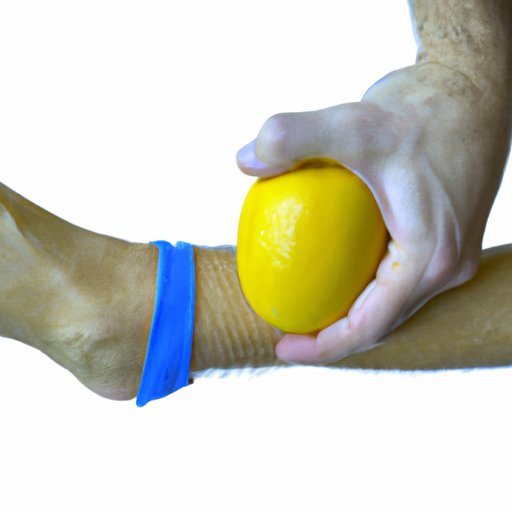
I. Introduction
Have you ever experienced a sudden and painful muscle cramp? Whether it’s a leg cramp that wakes you up in the middle of the night or a charley horse during an intense workout, cramps can be incredibly uncomfortable. Cramps can occur for a variety of reasons, but the good news is that there are many strategies you can use to relieve a cramp quickly or even prevent them in the first place. In this article, we’ll explore the causes and symptoms of cramps, quick remedies you can use for immediate relief, long-term solutions for preventing cramps, alternative treatments, and when to consult a healthcare professional.
II. Causes of Cramps
There are many different factors that can cause cramps. One common cause is muscle fatigue, which occurs when a muscle is overused or strained. Dehydration can also lead to cramps, as can low levels of potassium or other electrolytes in the body. Poor circulation can also be a contributing factor, particularly in older adults. By understanding what can cause cramps, it’s easier to prevent them from occurring in the first place.
III. Symptoms of Cramps
Cramps can be incredibly painful and lead to muscle tightness, sharp pain, and difficulty in moving. In severe cases, cramps may even result in muscle damage or tears. These symptoms can disrupt daily life and make it difficult to perform everyday activities such as walking or sleeping. It’s essential to address these symptoms as soon as possible to prevent further discomfort.
IV. Quick Remedies for Cramps
If you’re experiencing a cramp, there are many quick remedies that you can use to provide immediate relief. One simple solution is to stretch the affected muscle gently. Massaging the muscle can also help relax it and alleviate the cramp. Drinking fluids that are rich in electrolytes, such as sports drinks or coconut water, can also help relieve a cramp. Applying heat to the area, such as a heating pad or warm bath, can also help ease cramp pain. Trying one or a combination of these remedies can provide quick and effective relief.
V. Long-term Solutions for Preventing Cramps
While quick remedies can help relieve cramps, long-term prevention is the most effective strategy. There are several lifestyle changes that you can make to reduce the likelihood of experiencing cramps. Keeping your body hydrated by drinking plenty of water is one crucial step. Eating a balanced diet that includes foods rich in potassium, calcium, and magnesium can also help. Regular exercise, stretching, and avoiding overuse of muscles can aid in preventing cramps. By making these changes, you can help ensure that cramps don’t interfere with your daily life.
VI. Alternative Treatments for Cramps
For those who want to explore alternative treatments, there are several options available, including acupuncture, massage, or using a foam roller to massage out tight muscles. These treatments can help alleviate muscle pain and tension and may be helpful for those who experience cramps regularly. It’s essential to discuss these treatments with a healthcare professional before starting to determine whether they are the right option for you.
VII. When to Consult a Healthcare Professional
While most cramps are harmless, there are situations where they may be a sign of a more serious underlying health condition. If you experience frequent cramps that disrupt your daily life, it’s best to speak with a healthcare professional. Some criteria to consider when deciding whether to seek medical attention include cramps that last for an extended period, occur spontaneously, are accompanied by swelling or weakness, or occur following an injury. In these situations, it’s essential to seek medical advice to rule out any underlying health issues.
VIII. Conclusion
In conclusion, cramps can be uncomfortable and disruptive, but there are many remedies and strategies that you can use to alleviate them quickly and prevent them from occurring in the first place. By understanding the causes and symptoms of cramps, you can take steps to prevent them from occurring. Quick remedies such as stretching, massaging, and applying heat can provide immediate relief. Long-term solutions such as staying hydrated, eating a balanced diet, and exercising regularly can help prevent future cramps. Exploring alternative treatments and knowing when to seek medical attention can also be beneficial. By incorporating these strategies into your lifestyle, you can help ensure that cramps don’t interfere with your well-being.




